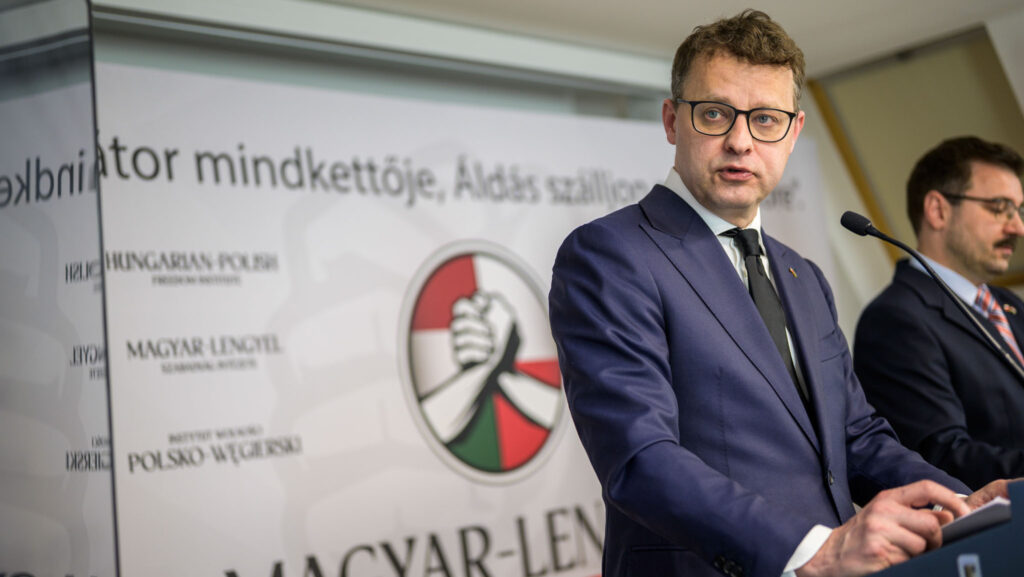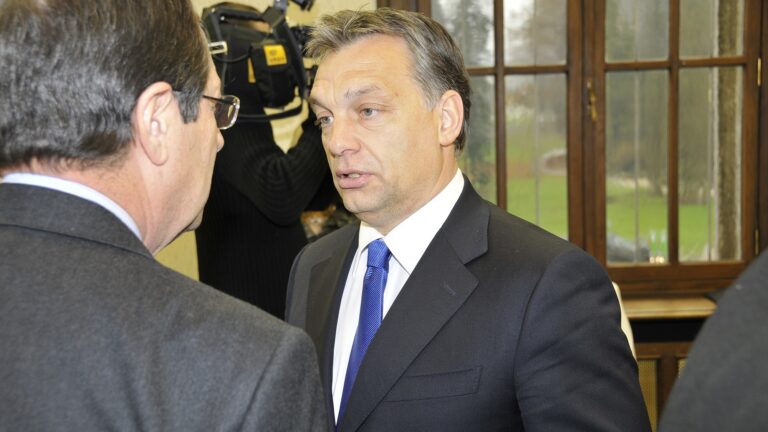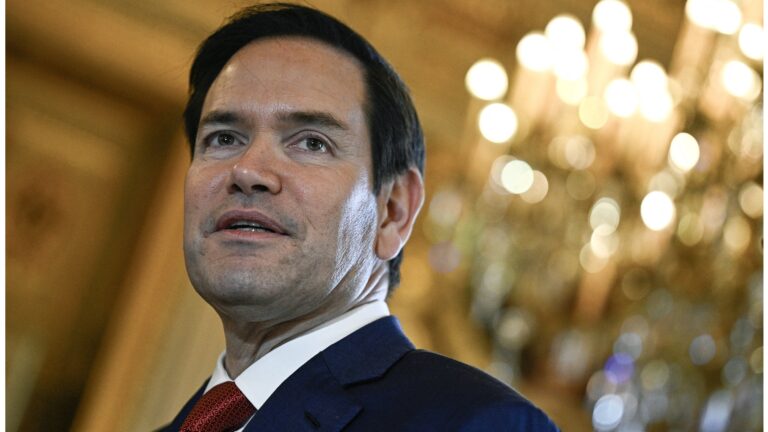At the third CPAC convened on European soil this month, Hungary will again become the theater of world-historical mutations.
It may be pointless to attempt tracing when exactly our socio-political imaginary turned this unsettled, but ever since that fateful hinge, all received wisdom on our fundamental public truths seems in perma-flux, with new suppositions heralded as truisms before turning veritably axiomatic.
This protean state of indefiniteness is nowhere in clearer display than in our liquified left-and-right divide around the weakening of the nation-state and the sundry shapes of post-national governance piloted in its looming wake. No longer is old-school chauvinism—if it ever truly was—an electoral liability in transnational races, instead spurring parties of the euro-skeptic right to amalgamate their sovereigntist platforms even across ethno-linguistic boundaries. This emergent ‘take-back-control’ bloc may have once deemed beyond repair the hemicycles, backrooms, and pulpits that populate the EU bubble. Less than two decades ago, these loci of supranational power in Brussels and Strasbourg may have seemed, to this crowd, ripe for dismantling. Yet the movement’s current leaders are now devising shared strategies to conquer them, resignify them—and subvert their purpose. Literarily inspired by our American allies, we at the Budapest-based Center for Fundamental Rights have taken to describing this mission as ‘draining the swamp’.
Never had this paradigm shift been closer to completion than ahead of the European legislative elections on June 9. Nowhere will it be on clearer display than on April 25 and 26 in Budapest, at the third edition of our Center’s flagship annual event, CPAC Hungary, the first and only offshoot of the flagship conservative jamboree to convene on European soil. Leaders of every shade of this coalescing national-conservative front will descend on the Danube riverbank with several goals in mind. They will swap notes on their varied approaches to a race for parliamentary euro-seats, that will nonetheless be waged nationally. Through pull-aside meetings, side chats and toasts, they will even boast of extra-continental affinities with leaders from latitudes as remote as Paraguay and Singapore. Most relevant to the vexed journalists who will justify their smearing campaign by alleging they were denied passes[1], these leaders will outline what euro-policies they seek to change through what every news outlet—even the vexed ones—is predicting will be an unprecedented right-wing majority in the euro-chamber[2].
While rallied by fellow sovereigntists from across the globe—not least Donald J. Trump’s GOP, whose ties to Hungary’s Fidesz have supplied endless journalistic fodder about the American right’s alleged mimetic descent into illiberalism[3]—this worldwide scheme to wrestle power away from unaccountable overlords will take Brussels as its opening salvo. The event is being fashioned as a campaign mega-rally encompassing the European Parliament (EP)’s two upsurging right-wing groups—the European Conservatives and Reformists (ECR) and Identity and Democracy (ID)—the ostracized Hungarian grouping they’ve both offered to incorporate (Fidesz), the customary holdouts from the right-of-center European People’s Party (EPP) and perhaps some heterodox outliers from the Socialists & Democrats (former Czech PM Andrej Babiš was reprimanded by the liberal ALDE group for attending last year[4]). Insofar as a new, right-tilting majority in Brussels and Strasbourg is followed by Trump’s return to the Oval Office come 2025, the former will be seen as having augured the latter (much as Brexit prefigured Trump’s first win in 2016[5]), a transatlantic concatenation of events whose initial stirrings will be traceable back to CPAC.
The pan-Western scope for which CPAC Hungary has come to be known will be on even plainer display this year
as the event’s guestlist and speaker roster enlarge significantly into the south-Western Hemisphere. Key US lawmakers and opinion-shapers will again appear, but so will virtually every country south of the Rio Grande see its delegation extended. Spain, culturally straddling the two hemispheres, is sending Vox President Santiago Abascal, whose party has put the revitalization of Hispanicity (Hispanidad) front and center of its alliance-building. Some of the main adherents to that effort will come, too, to nurture the increasingly dynamic Magyaro-Iberic network of intellectual and political exchange on the right: Chile’s José Antonio Kast, Colombia’s María Fernanda Cabal, and Brazil’s Eduardo Bolsonaro. This beefed-up presence of the Iberosphere comes at a time when the Euro-American right looks worriedly to the friendly Western nations of Ibero-America, where Bolivarian socialism keeps making undemocratic and violent inroads. On March 20, our Center opened its first office beyond Hungary’s borders, in Madrid, with the aim of helping its local partners halt that advance[6].
Part of this supranational sublimation of nationalism is reflexive. The West-European left, though long suspicious of pan-European institutions for bypassing democratic checks to impose wage-undercutting free trade, free movement of capital and market-driven globalization, was hardly ever skittish about forming robust networks of transnational cooperation—either of the social-democratic variant or the euro-communist sort—to arrest this neoliberal cooptation. The chasm remains open between old-school leftists yearning to snatch the supranational project away from the shackles of global capital and those resigned to the impossibility of that uncoupling in favor of a sovereigntist project of national-democratic restoration. It is unlikelier than ever to be closed, as the material concerns that ultimately drove the old-school left in either direction have become overshadowed by a sweeping agenda of social and cultural liberalism more easily legislated through supranational conduits, much as neoliberalism concomitantly appeared, following the Soviet Union’s collapse, a harder national sell to the allies of big capital. The new left is keener to view challenges in a post-national framing—say, the rights of asylum-seekers, sexual minorities, or the climate—and to react in kind, by forging transnational fronts to legislate non-popularly consented ‘solutions’.
This doesn’t reveal whether this new left is now persuaded that its prescriptions can be implemented democratically at the supranational level, for the stubborn impossibility of enacting them with popular consent at the national level could similarly be at fault. It may not be persuaded of much when it comes to political theory, but the left’s deliberate choice to bypass the nation—and thus any real pretense to self-government—is not a bug, but a feature. In either case, it views an insulated and unaccountable Brussels-based Leviathan as a surefire conduit for its agenda, thereby leapfrogging the petty constraints imposed by retrograde publics. This could be accurately defined as the progressive ‘U-turn on globalization’[7], but a fairer term would be the ‘left-globalist pincer movement’: whereas globalizing policy diktats were heretofore a bitter pill imposed from up above, now the same channels are being cleared for a cultural-progressive version of a not dissimilar philosophy.
Where do the left’s mutations leave its opponents? In the case of the nominally opposing parties of the legacy right-of-center, somewhere between mimesis and mimicry. Running athwart canonical Cristian-Democratic principles of subsidiarity and a spiritually infused yet politically constricted European project confined to prosperity-unleashing economic cooperation, the EPP’s leading factions have embraced not just the left’s progressive agenda, but also the method of shoving it down the electorates through the eurocratic backchannel. This opens the door for the nation-bounded right, in its struggle against the supranational uniparty, to be rallied by forces who may not see eye to eye on the substance of its counter-agenda, but who oppose the other side’s method—cue the centrists and old-school leftists who may be tempted to attend CPAC. The transnational anti-federalist response has been brewing for a while, and when it finally materializes, it may turn out to be trans-ideological too.
What was once the chief roadblock to this transnational fusion is fast becoming the chief reason why that fusion—now revealed to be inevitable—is notorious and merits pondering. The war in Ukraine has unearthed the potential for armed conflict to re-anchor nationalist parties in the primordial aversions and loyalties of traditional chauvinist politics. CPAC Hungary’s inaugural edition in 2022, held mere months after Russia’s invasion under the motto ‘God, Homeland, Family’, inauspiciously turned into the theater of the much-hyped Polish-Hungarian breakup, a respectful but profound parting of ways between Orbán’s Fidesz and Poland’s recently ousted government of the Law & Justice party (PiS)[8]. The two heretofore natural allies, whose cooperation had propelled the Visegrad Four bloc into a keystone EU subforum—bound further by the mutual admiration of their former anti-communist dissident leaders—soon realized that the national interest far precedes any pan-European ideological affinities.
The following edition deepened the rift, not least when the organizers placed freezing the conflict on par with defunding gender theory deanships, restoring parental rights in education and protecting borders in their triadic motto: ‘no gender, no migration, no war’ (the PiS delegation had slimmed down to near-naught by then, and other members of the PiS-dominated ECR may have felt similarly discomfited). Donald Tusk’s minoritarian victory late last year in Poland, and his ensuing vendetta against PiS, have somewhat began to thaw ties, even as the war approaches a standstill. This year’s CPAC promises to push the defrosting even further, as pro-peace and anti-Russia enthusiasts are being unwittingly pushed to meet in the middle by the conflict’s sheer dynamic. No longer is the ‘pro-Putin’ smear so easily thrown the way of Hungary’s ask for inserting financial transparency mechanisms to ensure the European aid goes to Ukraine’s war effort, for demanding tougher anti-corruption measures from Kiev, and linguistic rights for Transcarpathia’s ethnic Magyar minority. Conversely, the anti-Russia hawkishness of the Polish-led wing of the euro-right is being subjected to a test of feasibility—even if NATO member states jacked up their spending to 2% overnight, would that suffice to roll back Russia?—and questions are arising as to a potential freezing of the conflict.
Whereas the same ‘pro-Russian’ label the anti-Orbán press will doubtlessly affix on this forthcoming edition of CPAC hardly survives a five-minute Google search of the speakers, there’s another constellation of epithets around which the group will more easily cohere, though not in the self-identificatory manner the media speculates, but around the unanimous rejection of such a label.
The labels revolve around ‘illiberal’ but have grown to encompass such absurdities as ‘anti-humanist’ or even ‘fascist’.
James Q. Whitman, a Yale law professor writing at the Los Angeles Times last year, went as far as to compare CPAC Hungary to Benito Mussolini’s efforts to create a fascist international in the late 1920s, claiming ‘we badly need some way to get rid of Orbán’[9]. David Pressman, the chief catalyst of American interference into Hungarian elections as US ambassador in Budapest, is already well ahead on that plan[10].
‘Hitler was tragedy’, Professor Whitman wrote, ‘whereas Orbán—destructive as he is—is farce’. Yale Law School may wish to reassess its policy on sanctioning Holocaust trivializers on its faculty. But the innuendos of antisemitism that are often wrapped into these unrigorous parallels with Nazism, for a country with Europe’s most effective policy of fighting Jew-hatred, will fall even flatter as CPAC approaches, and rabbi Slomó Köves prepares to give his customary blessing to the event along with a Catholic priest and a Calvinist pastor. The weaponization of ‘rule of law’ for political point-scoring—the rhetorical grift underlying the ‘illiberal’ label—is a different matter, however. Although the fiction that Budapest is being subjected to financially punitive clauses solely on rule-of-law grounds is beginning to crumble as the EU Commission adds in Hungary’s child protection law on the chopping block of its conditionality mechanism, CPAC will be yet another occasion for the anti-Orbán media to posit that the PM is exporting not just substance but also a way to legislate it, a playbook to undermine democratic checks, minority rights and the independent judiciary. This will sound funny—‘farcical’, in Whitman’s terms—not just to EPP and S&D attendees, but also to the ECR and ID members who are fighting serious, endemic corruption and rule-of-law violations in their respective countries, such as in Spain and Portugal, without the slightest help from Brussels—or Whitman.
And this points to CPAC’s main potential contribution, not just as an electoral stomping ground, but also to the ongoing theoretical dispute across the West around the fate of nations and the role of ideologies. PM Orbán’s keynote, to inspire that contribution, should warn his allies lacking governing experience about what ruling along conservative lines is really like in the 21st century—based on his challenging, but altogether successful, experience. Protecting the innocence of children against efforts to sexualize them, upholding the legality of borders and asylum procedures, safekeeping the right of states to exercise national sovereignty in areas where it remains their legal prerogative: pursuing these aims isn’t a bed of roses, Orbán can attest first-hand. It exposes one to media disinformation, financial blackmail, and attacks on personal honor. Hungary is the telltale sign that legal norms and moral niceties have fallen prey to corrosive ideologies, but other would-be leaders who will attend CPAC inspired by its statesmanlike example shouldn’t be fooled. If they win, they’re next.
[1] Sebastian Murdock, ‘U.S. journalists denied entry to CPAC in Hungary’ (20 May 2022), HuffPost. https://www.huffpost.com/entry/us-journalists-denied-entry-to-cpac-in-hungary_n_6287b162e4b05cfc268ba1ba, accessed 10 April 2024.
[2] Eddy Wax and Sergey Goryashko, ‘EU election 2024: New poll shows right-wing populist surge’ (1 February 2024), POLITICO, https://www.politico.eu/article/right-wing-populist-surge-eu-election-policy/, accessed 8 April 2024.
[3] Nick Schifrin and Ethan Dodd, ‘Hungary’s Orbán gives Trump an “illiberal” roadmap for American conservatives’ (9 March 2024), PBS.org, https://www.pbs.org/newshour/show/hungarys-orban-gives-trump-an-illiberal-roadmap-for-american-conservatives, accessed 10 April 2024.
[4] ALDE Party Bureau statement on the participation of Mr Babiš at CPAC event (28 May 2023), ALDE Party, https://www.aldeparty.eu/alde_party_bureau_statement_on_the_participation_of_mr_babi_at_cpac_event, accessed 10 April 2024.
[5] Ronald F. Inglehart, Pippa Norris, ‘Trump, Brexit, and the Rise of Populism: Economic Have-Nots and Cultural Backlash’ (posted 6 August 2016), Social Science Research, Network. https://doi.org/10.2139/ssrn.2818659, accessed 8 April 224.
[6] Edgardo Pinell, ‘Los conservadores de Hungría y España se unen para «hacer a Occidente grande otra vez»’ (20 March 2024), El Debate. https://www.eldebate.com/internacional/20240320/conservadores-hungria-espana-unen-hacer-occidente-grande-otra-vez_183513.html, accessed 8 April 2024.
[7] Jorge González-Gallarza, ‘The Left’s About-Face on Globalization’ (25 January 2023), Newsweek, https://www.newsweek.com/lefts-about-face-globalization-opinion-1775907, accessed 10 April 2024.
[8] Flora Garamvolgyi, ‘Viktor Orbán tells CPAC the path to power is to “have your own media”’ (20 May 2022), The Guardian, https://www.theguardian.com/us-news/2022/may/20/viktor-orban-cpac-republicans-hungary, accessed 8 April 2024.
[9] James Q. Whitman, ‘American conservatives’ pilgrimage to Hungary is a joke’ (19 May 2022), Los Angeles Times, https://www.latimes.com/opinion/story/2022-05-19/cpac-hungary-viktor-orban-international-far-right-conservative-movement, accessed 10 April 2024.
[10] John Woods, ‘Biden administration interfering in Hungary’s 2022 general elections, says Hungarian deputy state secretary’ (26 October 2021), dailynewshungary.com, https://dailynewshungary.com/biden-administration-interfering-in-hungarys-2022-general-elections/, accessed 10 April 2024.








